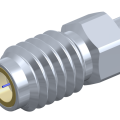Microfluidic mother machine chip is an advanced biochip technology that integrates microfluidics and cell biology, aiming to simulate and study various stages of mother cells in the cell cycle and related molecular and biological processes.
This technology utilizes microstructures such as tiny channels, microreaction chambers, and miniature valves to enable highly precise manipulation and observation of mother cells on a microscopic scale.
The following is a detailed overview of microfluidic mother cell microarrays, covering their principles, applications, advantages, and potential impact on cell biology and medical research.
Principles:
The microfluidic mother cell chip is based on the interaction of microfluidics and cell biology. Microfluidics studies the behavior of fluids in microscale droplets, microchannels, and microreactors, while cell biology focuses on the structure, function, and relationships of cells.
The microfluidic mother cell chip allows researchers to simulate and study cell division, the cell cycle, and other relevant biological processes.
These chips typically include microchannels, microreactors, microvalves, and other microstructures that enable precise control and observation of cells. Microchannels guide liquid, microreactors simulate the intracellular environment, and microvalves control fluid with precision.
In microfluidic mother cell microarrays, researchers can observe cell growth, division and other biological behaviors by precisely directing cell suspensions to specific locations through tiny channels.
By adding different growth factors, hormones, or other biologically active molecules to the tiny channels, researchers are able to mimic different physiological and pathological conditions and study in depth the response of the mother cell under these conditions.
Applications:
Cell Cycle Studies: Microfluidic mother machine chips can simulate and study various stages of the cell cycle, including cell growth, DNA replication, mitosis, and cell division. Real-time observation of cell behavior at different stages provides a comprehensive understanding of cell biology.
Drug Screening and Toxicity Testing: Researchers can use microfluidic mother cell chips to assess the effects and toxicity of drugs. Introducing drugs or toxins onto the chip and observing the cell's reaction helps screen potential drug candidates or evaluate the safety of compounds.
Fundamental Cell Biology Research: Microfluidic mother machine chips provide a highly controllable experimental platform for fundamental cell biology research. Researchers can dynamically observe cell behavior, gaining in-depth insights into intracellular molecules and signaling pathways.
Disease Model Construction: Introducing disease-related genes or pathological conditions into microfluidic mother cell chips helps construct more realistic disease models. This aids in studying the pathogenesis of specific diseases and finding treatment methods.
Advantages:
Highly Controllable Experimental Environment: Microfluidic mother cell chips offer a highly controllable experimental environment, including temperature, nutrient concentration, and growth factors. This helps simulate more realistic biological conditions.
Real-time Observation and Analysis: Due to the precise design of chip structures, researchers can observe cell behavior in real-time and perform immediate analysis. This provides richer data for research.
High Throughput and Efficiency: Microfluidic mother cell chips can simultaneously process multiple cell samples, achieving high-throughput experiments and improving experimental efficiency.
Precision Cell Manipulation: The design of microchannels and microreactors enables more precise cell manipulation, allowing researchers to exert accurate control over cells.
Potential Impact on Cell Biology and Medical Research:
Deeper Understanding of the Cell Cycle: Microfluidic mother cell chips are expected to deepen the understanding of various stages of the cell cycle, revealing new mechanisms in cell biology.
Accelerated Drug Development: This technology can more rapidly and efficiently assess the effects of candidate drugs, accelerating the drug development process.
Establishment of More Realistic Disease Models: Microfluidic mother cell chips can be used to construct more realistic and controllable disease models, providing a biologically meaningful platform for disease research.
Promotion of Personalized Medicine: By studying individual patient cells on the chip, microfluidic mother cell chips may play a crucial role in advancing personalized medicine, offering more customized treatment plans.
In-depth Exploration of Cell Heterogeneity: Thanks to the high controllability of mother cell chips, researchers can delve deeper into the heterogeneity of cell populations, aiding in the understanding of diversity and complexity within cell populations.
Conclusion: Microfluidic mother cell chips, as an application of microfluidic technology in cell biology and medicine, provide scientists with a highly controllable and precise experimental platform. Their advantages in simulating the cell cycle, drug screening, fundamental cell biology research, and disease model construction have made them a prominent technology in biomedical research.
Future Trends
Multidimensional Integration: Future microfluidic mother cell chips may focus on multidimensional integration, incorporating information from various levels, including cell biology, genomics, proteomics, and more. This comprehensive approach will contribute to a more holistic understanding of cell behavior.
High Throughput and Automation: With technological advancements, microfluidic mother cell chips are expected to achieve higher throughput and stronger automation, making them more suitable for large-scale experiments and efficient data collection.
Application in Disease Diagnosis: The application scope of mother cell chips may expand into the field of early disease diagnosis. Through dynamic observation of patient cells on the chip, more accurate diagnostic information can be provided.
Personalized Medicine: As research into patient-specific cells deepens, microfluidic mother cell chips are poised to become a crucial tool for personalized medicine, offering more precise and tailored treatment strategies.
Biomarker Discovery: This technology is expected to play a more effective role in biomarker discovery. By analyzing captured cells, new biomarkers can be identified and validated, providing more clues for early disease diagnosis and treatment.
Application in Tissue Engineering: The principles and techniques of microfluidic mother cell chips can also be applied to the field of tissue engineering. This could help construct more complex and realistic tissue structures.
Conclusion:
In conclusion, microfluidic mother cell chips represent a cutting-edge biotechnological tool that provides a highly controlled and precise environment for cell biology and medical research. Their applications in simulating the cell cycle, drug screening, fundamental cell biology research, disease modeling, and more have garnered significant attention in the biomedical research community.
Looking ahead, microfluidic mother cell chips are poised to play a pivotal role in personalized medicine, biomarker discovery, high-throughput experiments, and disease diagnosis. The continuous evolution of this technology holds the promise of unlocking new avenues for understanding cell behavior, unraveling disease mechanisms, and developing innovative therapeutic approaches. As innovations and applications persist, microfluidic mother cell chips are expected to contribute significantly to the advancement of scientific research and medical applications.
Dxfluidics Products

| Product Code | large channel dimensions | small channel dimensions | Thickness (mm) | Chip material | Price (CNY) | ||||
| Height (um) | Width (um) | extended channel length (um) | growth gradient (um) | Width (um) | Height (um) | ||||
| G0001 | 10 | 50 | 30&60 | 0.2 | 0.9-1.5 | 1.2 | 4+0.17 | PDMS+Glass | 600 |
| G0002 | 100 | 200 | 25 | 0.1 | 1.0-1.4 | 1.5 | 4+0.17 | PDMS+Glass | 800 |
Ordering Methods



© 2025. All Rights Reserved. 苏ICP备2022036544号-1




.png&w=120&h=120&zc=1&q=100)










